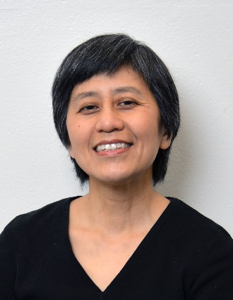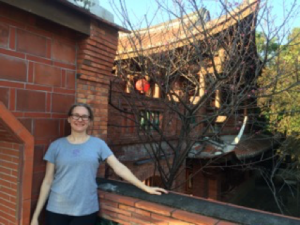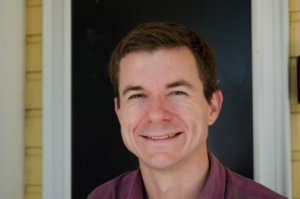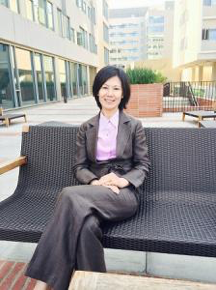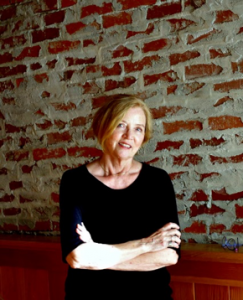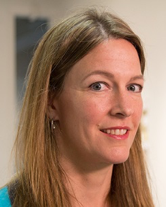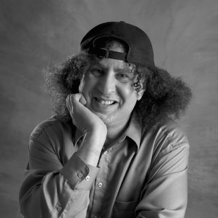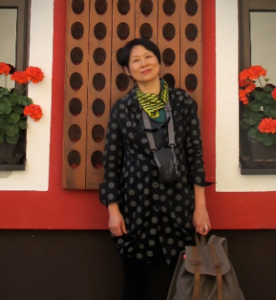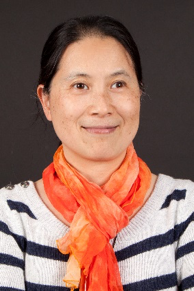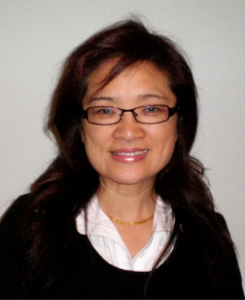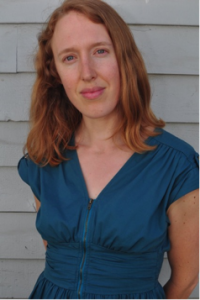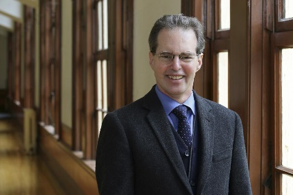 Doug Blandy
Doug Blandy
Arts and Administration, Senior Vice Provost for Academic Affairs
Professor Blandy’s research and teaching addresses art and educational experiences in community-based settings. He is one of the founding scholars associated with the web-based project ChinaVine, whose mission is to educate children, youth, and adults about China’s cultural heritage. ChinaVine was initiated in 2007 by scholars associated with the University of Oregon (UO), University of Central Florida (UCF), and Shandong University of Art and Design (SUAD). Ten years later ChinaVine consists of partnerships with additional universities such as East China Normal University, Beijing Normal, Minzu University, and the University of Maine. Partnerships in China also include the China Folk Literature and Art Association and the Beijing Folk Literature and Art Association. Associated with these partnerships is the opportunity for scholars and students in China and the UO to do collaborative fieldwork in China. Where possible, fieldwork concentrates on interviews with artists and craftspeople coupled with the use of still photography and video to document their work. Interpretation of the fieldwork is the source material for achieving ChinaVine’s mission. In addition to the fieldwork, prominent Chinese folklorists have been interviewed about their scholarship and the contributions that Chinese folklorists are making to the larger fields of which they are a part. The publicly available materials associated with ChinaVine are freely available for use for educational non-commercial purposes under a Creative Commons license. You can access them here.
Roy Chan
Professor, East Asian Languages and Literatures
Professor Roy Chan focuses on 19th and 20th century Chinese literature, but also has formal training in 19th and 20th century Russian literature. He explores the relationship between the two cultures from the 17th century to the present. While his parents were immigrants from China and Hong Kong, he only started to spend significant time in China when he was a graduate student studying Chinese at Beijing’s Tsinghua University in 2005. From 2007-2008, Prof. Chan returned to Tsinghua University as an Institute of International Education Fulbright Scholar, where he conducted research on modern Chinese literature and worked on his PhD dissertation. During this period, he also spent time doing archival research at the Shanghai National Library. After completion of graduate school, Prof. Chan returned to Tsinghua in the summer of 2010 for additional research. In 2016, he conducted research and gave a research presentation at the University of Hong Kong. He also met colleagues at the Chinese University of Hong Kong, Lingnan University, and Hong Kong Baptist University. In the next year, Prof. Chan hopes to further develop scholarly connections in Taiwan and Singapore. You check out Prof. Chan’s work here.
Nancy Yen wen Cheng
Professor, Department of Architecture
Professor Nancy Yen-wen Cheng (RA, LEED AP) has taught sustainable architectural design and digital methods at the University of Oregon since 1996, and directed the Oregon Architecture Department’s Portland Program from 2009 to 2013. She researches how tools and approaches shape the design process, focusing on digital tools as a source of innovation and cultural change. Recently she has been examining how sculpted surfaces can affect airflow in ventilated facades. Since pioneering Virtual Design Studios as a University of Hong Kong (HKU) Lecturer 1993-96, Prof. Cheng has used Internet technology to enhance learning and expand the classroom. She fostered a University of Oregon student exchange with HKU 2002-2005 and since 2010, Prof. Cheng has worked with the Center for Asian and Pacific Studies in directing an exchange with the Xian Dai Architectural Design Group, welcoming architects to study sustainable design and sending students to Shanghai for summer internships. You can check out a class blog here and more information on summer internships here.
Li-Shan Chou
Professor, Department of Human Physiology
Professor Li-Shan Chou’s research focuses on balance control during locomotion, and applies engineering and mechanical theories to further develop understanding of the mechanisms of movement. Having graduated from the Engineering school at Tatung University in Taiwan, Prof. Chou has worked with professors and students in Biomedical Engineering and Product Design at Tatung, and forged connections between the UO Product Design Program at colleagues in Taiwan. Prof. Chou travels to Taiwan two or three times a year, and is organizing a conference (together with Prof. Tung-wu Lu at the National University of Taiwan) that will features more than 130 papers with scholars from 19 countries. Eager to foster the development of students in human physiology, Prof. Chou has participated on dissertation committees and advised students at many universities in Taiwan, and also has hosted visiting scholars from Nanjing Normal University. Discussion of collaborations with East China Normal University (Shanghai), Shanghai Sports University, and Shaanxi Normal University (Xi’an) are underway, and Prof. Chou is working with various contacts to encourage physical activity in China and Taiwan through a summer program at UO that would emphasize injury prevention, sports law, and business.
Howard Davis
Professor, Department of Architecture
Professor Howard Davis studies how the form of cities and the architecture of their buildings help enable diversity, social and cultural sustainability, and resilience. Through fieldwork in Guangzhou in collaboration with the architecture department at the Guangzhou Academy of Fine Arts, Prof. Davis has traced the architectural form of buildings originally build in the late 1800s and early 1900s in the city, evaluating the factors that have sustained resilience over decades of economic and political changes. Working with Prof. David Lung at Hong Kong University—former dean of the architecture school, well-known conservationist, and winner of the Lawrence Medal at the UO—Prof. Davis has co-authored and presented a Massive Online Open Course (MOOC) on the vernacular architecture of Asia. Prof. Davis continues his work in Hong Kong through work with PhD students at HKU, program evaluation at Chu Hai College, and conference presentations.
Dejing Dou
Professor, Department of Computer Science
Dejing Dou is a Professor in the Computer and Information Science Department at the University of Oregon and leads the Advanced Integration and Mining (AIM) Lab. He received his bachelor degree from Tsinghua University, China in 1996 and his Ph.D. degree from Yale University in 2004. His research areas include artificial intelligence, data mining, data integration, information extraction, and health informatics. Dejing Dou has published more than 60 research papers, some of which appear in prestigious conferences and journals like AAAI, KDD, ICDM, SDM, CIKM, ISWC, JIIS and JoDS. His DEXA’15 paper received the best paper award. His KDD’07 paper was nominated for the best research paper award. He is on the Editorial Boards of Journal on Data Semantics and Journal of Intelligent Information Systems. He has been serving as program committee members for various international conferences and as program co-chairs for four of them. Dejing Dou has received over $4.5 million PI research grants from the NSF and the NIH. He was promoted to Full Professor in 2016.
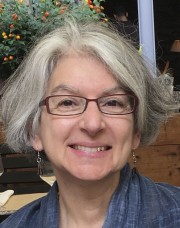
Bryna Goodman
Professor, Department of History
Professor Bryna Goodman is a historian of modern China. Her current research is on Chinese finance and concepts of economics in the early 20th century. She travels to China frequently for research and conferences and maintains close relations with the Institute of Modern History at the Shanghai Academy of Social Sciences, the History Departments at Fudan University and East China Normal University, and the Institute of Modern History at Academia Sinica in Taiwan. She had held and holds various advisory, editorial, and consulting positions on boards in China and Taiwan, including Academic Advisor, Center for Social History Research, Institute of Modern History, Chinese Academy of Social Sciences (2013-16); Member, Academic Advisory Board, Center for International Research on Shanghai History, Fudan University, Shanghai, PRC (2013-); Editorial Committee, International Research on Shanghai History, Shanghai Academy of Social Sciences and Fudan University (2013-); Editorial Consultant, Research on Women in Modern Chinese History, Academia Sinica, Taiwan (2013-); and Editorial Board Member, Twentieth-Century China (2008-).
In addition to her work in the History Department at UO, Prof. Goodman served three terms as the director of Asian Studies and one term as director of the UO Confucius Institute for Global Studies. In 2013 she was elected to the China and Inner Asia Council of the Association for Asian Studies. She founded the University of Oregon—University of Washington—University of British Columbia Northwest China Forum, and has twice co-organized the Chinese Independent Film Series at UO.
Alison Groppe
Professor, East Asian Languages and Literatures
Professor Alison Groppe researches modern and contemporary Chinese literature and film, specializing in expressions of identity and historical critique in Chinese-language texts produced by authors and filmmakers of Chinese descent born in Malaysia and Singapore. As a 2016 recipient of a Taiwan Fellowship funded by the Ministry for Foreign Affairs (Republic of China), she recently spent four months researching, lecturing, and interviewing scholars and authors in Taiwan. During this time, she was affiliated with the Center for Chinese Studies at the National Central Library in Taipei. She visited and lectured at National Sun Yat-sen University in Kaohsiung under the sponsorship of Professor Tee Kim Tong; visited and lectured at National Chiao Tung University in Hsinchu under the sponsorship of Professor Lim Kien Ket; and visited National Chung Hsing University in Taichung under the sponsorship of Professor Chiu Kuei-fen. In Taipei, she has contacts at National Taiwan University, Academica Sinica, and the National Culture and Arts Foundation. In Malaysia, she has contacts at the University of Malaya and Malaysian Chinese Research Centre. In Singapore, she has contacts at the National University of Singapore and Nanyang Technological University.
Luke Habberstad
Professor, East Asian Languages and Literatures
Professor Luke Habberstad is a specialist in the history, literature, and religion of early China (late 5th century BCE – 2nd century CE). His research focuses on the many changes in literary production, religious practice, and material culture that occurred during the long process of imperial unification under the Qin and Han dynasties. Prof. Habberstad has conducted research at Academic Sinica in Taiwan as a resident research fellow; participated in academic conferences and workshops in China, Taiwan, and Hong Kong; and is currently planning a collaboration on a cache of late 2nd century CE excavated documents with a colleague from Shanghai Jiaotong University. He has presented his research at National Taiwan University, Minzu University (Beijing), and Hong Kong Institute of Science and Technology.
Zhuo Jing-Schmidt
Professor Emerita, East Asian Languages and Literatures
Zhuo Jing-Schmidt researches at the interface of language structure, language change, cognitive and affective processes of verbal communication, and the linguistic construction of social reality. Her current projects focus on figurative language in Chinese political discourse, as well as linguistic innovation and its mediality in wireless China. She collaborates with scholars in research communities in greater China including Hong Kong, Taiwan, and the Mainland. Prof. Jing-Schmidt co-edits the Handbook of Chinese Applied Linguistics with Chu-Ren Huang of Hong Kong Polytechnic University and Barbara Meisterernst of Humboldt University Berlin. She also collaborates with Shu-kai Hsieh of National Taiwan University on Chinese language in the new media. Prof. Jing-Schmidt has given talks at Beijing University and University of Macau, and will be holding invited workshops on Cognitive Linguistics at the Nanjing Polytechnic University and Capital University of Economics and Business in Beijing in Fall 2016.
Wendy Larson
Professor, East Asian Languages and Literatures
Professor Wendy Larson is a specialist in modern Chinese literature, film, and culture. Her books include From Ah Q to Lei Feng: Freud and Revolutionary Spirit in 20th Century China (2009); Women and Writing in Modern China (19980); and Literary Authority and the Chinese Writer: Ambivalence and Autobiography (1991). A study of the filmmaker Zhang Yimou entitled Zhang Yimou: Globalization and the Subject of Culture will be published in 2017. Prof. Larson is working on a monograph on comparative optimism under Chinese socialism and American capitalism in the 1950s. Prof. Larson has studied in both Taiwan (as an undergraduate) and China, where she spent two years at Beijing University. She often travels to China, Singapore, and Hong Kong. Recently, she spent four months at Eastern China Normal University (ECNU), an institution with which the University of Oregon has close ties, including a jointly-managed Confucius Institute. She has also hosted Li Haixia, a professor from Shanghai University, as a visiting scholar at the University of Oregon. In December, 2016, Prof. Larson will present her recent work at the Chinese University of Hong Kong and at Hong Kong Baptist University.
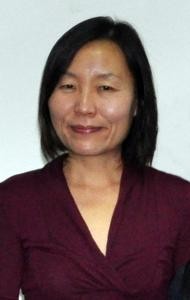 Gyoung-Ah Lee
Gyoung-Ah Lee
AssociateProfessor, Department of Anthropology
As an archaeologist, I examine human-environmental interactions in terms of cultural resilience and social complexity in East Asia, a core area where several economically important plants were first domesticated, influencing social and economic relations to this day. The goal of my work is to document and understand the transition from hunting-gathering-fishing to farming; role of agriculture in the development of social complexity; and domestication of East Asian crops. To accomplish these goals, I have conducted fieldwork in several regions in China, Korea, Indonesia, and Vietnam. I use an interdisciplinary approach including archaeology, cultural anthropology, history, genetics, and environmental sciences, with my publications appearing in scientific journals across several disciplines (e.g., PNAS, PLOS ONE, The Holocene, Antiquity, Anthropocene, Current Anthropology, Journal of Archaeological Sciences). I have awarded multiple internal and external grants from the Henry Luce Foundation/American Council of Learned Society, Social Sciences and Humanities Research Council of Canada, and the Academy of Korean Studies.
Kiersten Muenchinger
Professor, Product Design Department
Professor Muenchinger studies new materials and their processing methods, aiming to understand when and why the newest materials technologies are accepted in mass-produced consumer products. In 2015-16, she taught in the Industrial and Systems Engineering (ISE) Department at Hong Kong Polytechnic University (PolyU), while researching polymer sustainability. Prof. Muenchinger also has made connections with the School of Design, in particular with their well-known Product Design (PD) department, and is working to connect them with the Product Design program at UO for student exchanges and group projects. Planning for joint projects in 2016-17 is underway. Sports Product Management and Sports Product Design also collaborate with HKRITA, the Research in Textiles and Apparel center at PolyU, to work on joint research projects. In addition to these connections in Hong Kong, Prof. Muenchinger is developing faculty exchange opportunities with Prof. David Pong at the University of Macau. The UO Product Design Program also has connections at Tatung University in Taipei, Taiwan, where several faculty members have presented talks. Tatung master’s students in Industrial Design can come to UO on exchange for 1 term, and so far, about three have come each quarter.
Jeffrey Stolet
Professor, Department of Music
Professor Jeff Stolet, one of the earliest Knight Professors at UO, works in Music Technology and specializes in real-time computer music composition and performance. An introduction from a friend in visual arts led Prof. Stolet to take a trip to the Central Conservatory in Beijing, China’s premier music conservatory. He now visits annually, and is committed to establishing an ongoing relationship, both teaching students and sharing ideas and techniques with colleagues. Prof. Stolet also is an honorary professor at the Sichuan Conservatory in Chengdu, and professors from the Conservatory also have visited the College of Music and Dance at UO. This rich collaboration has helped turn the Conservatory into a well-known center for electronic music in China. In addition to his work in Beijing and Chengdu, Prof. Stolet has taught, performed, and lectured at the Shenyang Conservatory, the Shanghai Conservatory, the Wuhan Conservatory, the Nanjing University of the Arts, the Zhejiang Conservatory, the Xi’an Conservatory, Xiamen University, and the Guangzhou Conservatory. He notes that working with less advanced students has the advantage of creating an exciting and influential dialogue just as the students are developing their own styles.
Ying Tan
Professor, Art Department
Born in Qingdao, China, Professor Ying Tan is a professor in digital art at the University of Oregon. She served as the head of the Electronic Art Department at the Atlanta College of Art, and as director of the Multimedia Design program at the University of Oregon. Her creative practice as an artist and designer has resulted in a range of work that includes film, video, animation, digital imaging, landscape painting, and communication design. Prof. Tan’s work has exhibited and screened both nationally and internationally. In 2005 she helped to establish the connections between UO and SUAD for academic exchanges, organized art faculty exhibition in China, and created UO Summer Art in China Program. She led UO students to China to work with Chinese students and professors to creative joint public exhibitions both in China and in US. She already taught a summer course welcoming Chinese faculty and students to UO campus for international art collaboration and exhibition. Prof. Tan is currently the co-chair of Advisory Committee for Chinese American Art Faculty Association, and actively engaged in organizing an Art Exhibition and Symposium “Perception and Vision,” in Hongli Cheng Art Museum, Guizhou, China.
John Toner
Professor, Department of Physics
Professor John Toner is a theoretical condensed-matter physicist whose research interests include liquid crystals, superconducting glasses, supersolids, equilibrium and non-equilibrium hydrodynamics, and active matter. Prof. Toner has research affiliations and collaborations with several physics professors in or from China. Most recently, Prof. Leiming Chen from the China University of Mining and Technology in Suzhou, who studied with Prof. Toner at UO and graduated with a PhD in 2006, has visited the university. Prof. Toner also has collaborated with Prof. Yuhai Tu, who works at the IBM Watson Research Center in New York and has a joint appointment at Beijing University. Another collaborator of Prof. Toner’s, Prof. Dung-hai Lee at UC Berkeley, originally from Taiwan, is also a frequent visitor to Beijing University, as is Prof. Chiu Fan Lee, who works at Imperial College in London while retaining ties to Hong Kong. Recently, Prof. Toner presented his research at a conference entitled “Physics of Active Matter”, held at Soochow University.
Hailin Wang
Professor, Department of Physics
Professor Hailin Wang works on experimental optical and condensed matter physics. Having graduated from the University of Science and Technology in Hefei—a member of the C9 League composing the nine top universities in China—Prof. Wang has done collaborative research with faculty there and recruited post-doctoral researchers and graduate students. His former post-doctoral fellow, Chunhua Dong, now a professor at the University of Science and Technology, often visits UO to present his work, and assists with connections on the China side. Presently in his third year of a 3-year visiting position in Hefei, Prof. Wang spends a few weeks in China every year, and has given talks and worked with students and junior faculty on research projects. The increasing availability of excellent lab conditions and support in China has fostered an exciting research environment in China, and enhanced the possibilities for collaboration. When Prof. Wang learned of graduate student Mayra Amerzcua’s interest in China and knowledge of the Chinese language, he helped her find NSF funding to work at Peking University in the summer of 2016, where she will work with Prof. Yunfeng Xiao and his graduate students
Xiaotong Wang
Chinese Studies Specialist, East Asian Cataloging Team Leader, UO Libraries
A native of Beijing, China, Ms. Wang worked as the script writer and translator/interpreter at China Central Television before coming to the UO for her graduate studies. In addition to her work at the UO Libraries, she has been involved in several translation projects related to China, including Young and Restless in China, and China: A Century of Revolution by the Ambrica Productions, and PBS’s Art:21 series on Chinese avant-garde artist Cao Fei. Ms. Wang is active in establishing connections with libraries across China, including Peking University Library, Beijing Normal University Library, the Library of the Chinese Academy of Social Sciences, Tianjin Municipal Library, and Xiamen University Library. She has participated in workshops and other projects in China and has worked with her counterparts both in North America and in China by bringing them and their expertise to the UO through exchange programs and public talks. Ms. Wang has attended the Pacific Rim Research Libraries Alliance (PRRLA) annual conferences held in Beijing, Macau, and Canada, and she helped in hosting the most recent PRRLA conference at the UO Libraries in 2015. She is currently involved in two projects related to China. One is the China-U.S. Translation and Research Collaboration Project on Electronic Resource Standards and Recommended Practices in the United States. The second other is a project concerning The Catalogue of Ancient Chinese Books Collected in North America, part of the General Catalogue of Overseas Ancient Chinese Books.
Dr. Jean Wu
Senior Instructor, East Asian Languages and Literatures
Dr. Jean Wu currently teaches Chinese language courses at UO, and her ongoing research involves second language acquisition, Chinese linguistics, pragmatics, and Chinese curriculum development. Her previous teaching experience includes college-level courses in linguistics, Integrative Studies in Arts and Humanities—East Asia, Chinese calligraphy, and the English language. In addition to her current role as Academic Director of the UO Chinese Flagship Program and undergraduate Chinese Advisor at EALL, Dr. Wu has served as Coordinator of the UO Chinese Program, faculty director for the UO study abroad program in Harbin China, faculty director for the Living the Language Chinese Program in Global Scholar Hall, and also on the China Executive Board of Oregon University System. Her other professional experience includes editing and reviewing Chinese language books for select publishers in the US.
Yizhao Yang
Professor, Department of Planning, Public Policy and Management
After completing an undergraduate degree in Architecture at Tianjin University in Beijing and a Master’s degree in Building Science at Tsinghua University, Professor Yizhao Yang came to the United States, where she completed a second Masters and PhD degree at Cornell University in Urban Planning. Her research interests include the relationships between the built environments and people, as well as culturally-based place-making knowledge and practices. Although Prof. Yang initially focused on urban planning in the U.S., she became more interested in China around 2010. Attending planning conferences, developing relationships, and taking advantage of survey and research opportunities in China. In 2012 Prof. Yang established a visiting scholar program with the Chengdu City Institute of Planning and Design. Prof. Yang also developed a close collaboration with Prof. Hu Jie of the Beijing Tsinghua Tongheng Urban Planning and Design Institute. Prof. Hu Jie has visited UO as an Oregon Global Scholar. Prof. Yang directs the China Program under the Sustainable Cities Initiative (SCI-China), which organizes visiting scholars, training workshops, and collaborative research projects, the latter in partnership with several planning and design institutes in China (e.g., the China Academy of Urban Planning and Design in Beijing).
Dr. Monica E.M. Zikpi
Chinese Flagship Coordinator, University of Oregon
Dr. Monica E M Zikpi is the Chinese Flagship Coordinator at the University of Oregon and a scholar of classical Chinese literature. She completed her PhD in Comparative Literature at the University of Oregon in 2014 with a dissertation on issues of reception history and translation in the Warring States text “Li Sao.” The bulk of the research for the dissertation was conducted at Hunan University in Changsha, China, with guidance from Chuci expert Guo Jianxun, and with the support of a Fulbright research grant.
After graduation, Dr. Zikpi spent two years at the UO as a Visiting Assistant Professor of Chinese Literature, teaching literary Chinese language, contemporary film, and more. She now helps undergraduate students connect to China through the Flagship program, and continues her research. Her areas of specialty are early Chinese poetry and poetics, especially Shijing and Chuci; hermeneutics; material culture; critical theory; and translation studies. She investigates classical Chinese texts from the interdisciplinary perspective of Translation Studies, while testing the theoretical claims and implicit assumptions of Translation Studies against the concrete test cases of early Chinese literature. She has published work on Guo Moruo’s modernizing translation of Qu Yuan and on her own philologically-based “emergent” approach to translating the Shijing. Current projects include an analysis of the gender bias in the exegesis of religious imagery as transmitted in the earliest received edition of the Chuci and a study of the translation ethos of Ezra Pound’s “Confucian” version of the Shijing. In the long term, she is planning a bilingual variorum edition of the “Li Sao” (with a comprehensive digital companion version), a book on the impact of material and institutional conditions of transmission on the production of the meaning of the Chuci, an analysis of the Dunhuang manuscript fragment of a lost “Li Sao” commentary attributed to the monk Daojian, and a study of the application of Chinese Buddhist scriptural hermeneutics to non-Chinese and secular texts. She is also currently working on a full translation of the Tang dynasty philosophical treatise “On the Doctrinal Distinctions of the Huayan One Vehicle” (with Prof. Taitetsu Unno and Prof. Mark Unno).


